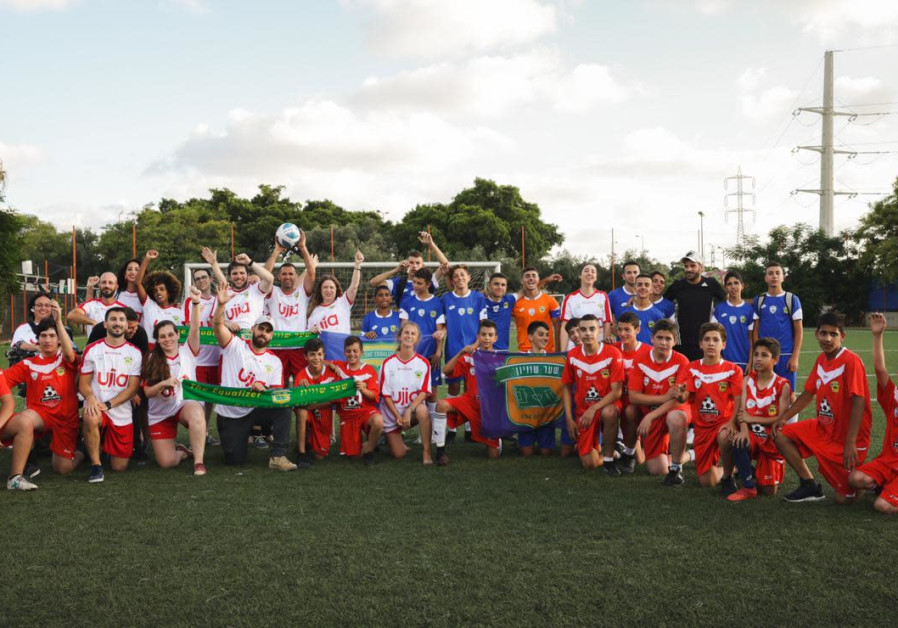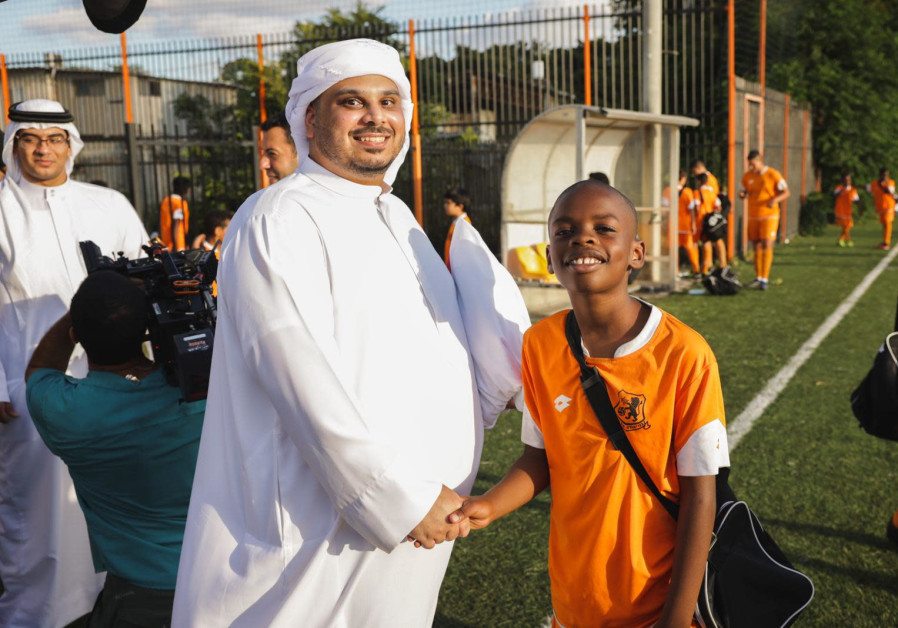Saoud Saker, a 30-year-old engineer from Dubai, strides into a Tel Aviv restaurant where a reception is being held for the delegation of young people from the United Arab Emirates, Bahrain and Morocco. He is dressed in a long, bright white robe called a thawb.
“Where are you from?” calls out an Israeli woman sipping coffee at an outdoor table.
“From Dubai,” he answers.
“Welcome, welcome,” she says. “We are so happy you are here to visit and we hope to visit your country soon one day.”
As Saker walks into the restaurant where a TV crew is waiting to interview him, he smiles.
“Our mission here is to spread peace and I’m very happy to make connections,” he tells The Jerusalem Report. “I’m very glad that people see me in traditional dress and they are welcoming me.”
The visit, sponsored by an organization called Israel-is and Israel’s Strategic Affairs Ministry, was not all smiles. Called “Finding Abraham, Leaders of Tomorrow,” the visit was held just after the conflict between Israel and Hamas in Gaza in May, and several Emiratis who had planned to come dropped out, fearing public criticism.
“I felt terrible,” says Matan Dansker of Israeli-is. “Not because of the name-calling. I grew up here and I’ve seen and heard much worse. But these were my guests and that made me very angry.”
The delegation was a return visit to Israel, after a delegation of Israeli social media influencers from Israel visited Dubai in April. This time, there were two Bahrainis as part of the delegation, as well as a woman from Morocco and several Emiratis.
Israeli media were very excited about the Bahrainis, one of whom – Mansoor bin Shamekh al-Marzooqi – stayed on to become the first student from Bahrain at the IDC in Herzliya. The other, Yusuf Yusuf, was thrilled to be in Israel, which he says is a great tourist destination.
“I would not have thought this opportunity to visit Israel would come in my lifetime,” he tells the Report, adding that Bahrain has always had a Jewish community and that the synagogue in Bahrain was recently renovated.
He hopes Israelis will come visit Bahrain just as they descended on Dubai after the Abraham Accords were signed.
The delegation to Israel came just weeks before Foreign Minister Yair Lapid became the first senior Israeli official to visit the UAE since the Abraham Accords last year. Lapid inaugurated an Israeli embassy in Dubai and consulate in Abu Dhabi. While there, he called on the Palestinians to restart peace talks with Israel that have been frozen for years.

The Jewish community of the UAE, which numbers about 1,000 expats, also welcomed Lapid’s visit.
“We are honored to welcome Foreign Minister Lapid,” says Chief Rabbi Yehuda Sarna. “The Jewish community in the UAE is thrilled by what this trip represents: a growing bond between the UAE and Israel.”
“We hope that the Foreign Minister’s visit will be a harbinger for further religious, business and cultural exchange and opportunities between our two nations,” says Senior Rabbi Dr. Elie Abadie.
Back in Israel, the Arab delegation was getting to know an Israel that many tourists never get to see. The trip began in the dusty town of Yeruham in the Negev town of Yeruham, which was established in 1951 as a transit camp for new immigrants from Arab countries. There the group met with the “Culinary Queens of Yeruham,” women cooking and selling traditional Moroccan food. They also met the mayor before spending the night in a Bedouin tent.
For some participants, it was their first exposure to the Holocaust. Emtiyaz Al-Sharabi, a British computer science teacher who lives in the UAE, and wears a hijab, was visibly moved after meeting Holocaust survivor Shoshanah Gezunthait at Yad Vashem, Israel’s Holocaust Memorial Museum.
“Shoshanah Gezunthait’s account of the Holocaust reduced me to tears – it was heart breaking to hear the account first hand,” she tells the Report. “Words can not describe the pain and suffering the survivors went through.”
She says that friends told her to “be careful” when she told them she was coming to Israel, but she felt very safe in the country.

Several young Israelis, both Jewish and Arab, joined the trip. Odelia Fitusi is a young woman with disabilities who uses a wheelchair. She is also Israel’s representative to the UN Convention on the Rights of Persons with Disabilities. She said that meeting young Arabs was a good experience.
“I believe that people with disabilities can be a bridge,” Fitusi says. “There are people with disabilities in all nations, in all traditions. We are 15% to 20% of the population. We are more than our identity or color or religion, and we have learned to have courage in life.”
Filmmaker Malcolm Green also joined the delegation and is making a film that will be presented at the UN in September to mark the one-year anniversary of the Abraham Accords.
“This film is probably unlike any other film I’ve made which I love,” he says. “It’s a journey. The title is ‘Finding Abraham’ and I’m focusing on the six-day-peace (the length of the trip) instead of the Six Day War.”
